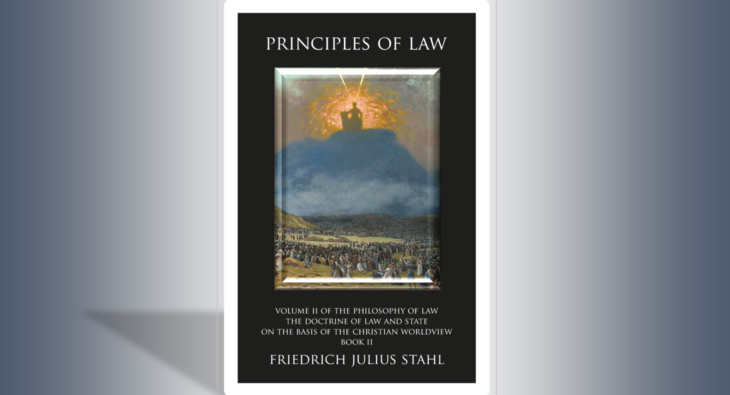
Second Edition
Publication date: June 5th, 2024
 The Christian difference to the legal order is not to be found in any religious test or requirement of conformity, but in the Christian character of legal institutions. Stahl accomplishes this by making institutions rather than actions the cornerstone of law. Law is a general rule, not a specific command; and institutions, not persons, are its primary object. Persons operate within the framework established by law, but that law is an external, objective framework, not an internal, subjective one. The right of the person and the rights of persons are established and defended precisely by this objectively Christian order. Therefore, what is Christian about this legal order is the principles, the law-ideas, upon which it is based, not the level of faith of those living within it.
The Christian difference to the legal order is not to be found in any religious test or requirement of conformity, but in the Christian character of legal institutions. Stahl accomplishes this by making institutions rather than actions the cornerstone of law. Law is a general rule, not a specific command; and institutions, not persons, are its primary object. Persons operate within the framework established by law, but that law is an external, objective framework, not an internal, subjective one. The right of the person and the rights of persons are established and defended precisely by this objectively Christian order. Therefore, what is Christian about this legal order is the principles, the law-ideas, upon which it is based, not the level of faith of those living within it.
This Christian orientation also demands a respect for the Christian inheritance of the nation, conservation of its received institutions and laws. Law is rooted in custom and tradition, supplemented through legislation. The courts are bound to the law as the expression of the historical people, not ephemeral public opinion.
The major error of modern legal philosophy is its natural-rights orientation, which makes law and the state into the creatures of individual choice, in which individuals through a social contract choose to leave the “state of nature” and form a government and a set of laws under which to be ruled. This whole approach is oblivious to the fact that human social order, being an inheritance, is a higher order transcending individual choice.
Modern legal philosophy compounds its error by making natural law into a directly applicable legal standard, or alternatively by abandoning the law to the play of interests, cutting off any influence from higher principles. For its part, natural law lacks objectivity, universal recognition, and publicity in the sense that it can be known by everyone ahead of time; it therefore cannot be enforced by the state. In fact, to do so is to establish opinion and thus injustice as law.
God’s divine order is the archetype of law, but it is not directly applicable as law. In fact, God commands that the law as it stands is to be obeyed, regardless of its correspondence to the higher principles of law. Human freedom under God is the freedom to crystallize and make concrete those God-revealed principles of law as a positive legal order.
In this second edition of Principles of Law, there is no difference in content as compared with the first (apart from a few minor footnote additions), but the text has been corrected where necessary and improved where appropriate.
From “Books in Little,” The University Bookman, Volume 47, No. 1 (Winter 2010):
Alvarado’s two volumes make available for the first time in English the life and writings of Bavarian born legal scholar Friedrich Julius Stahl (1802–1861). Stahl, a convert from Judaism to Lutheranism, “stood as one of the last in a long line of confessing Christian statesmen drawing upon the fast-disappearing common-law tradition of the vanished Holy Roman Empire.” Following Burke and von Savigny, Stahl articulated for the Historical School of Jurisprudence a conservative legal philosophy in which “authority, not majority . . . established the framework of the social order.” Stahl located the source of authority in Christianity, which provides the commands and principles through which institutions, the cornerstone of the law for Stahl, provide order and allow for authentic liberty.
Alvarado frames Stahl’s life between two cataclysmic events: The French Revolution and German unification. Whereas the former’s attack on Christianity and authority gave Stahl his life’s task, the latter’s rejection of Christianity and tradition in favor of blood and iron brought Stahl’s work to an unrealized end. After sketching Stahl’s early life and the factors that contributed to his legal philosophy, including his German patriotism, orthodox Lutheranism, and von Savigny’s Historical School, Alvarado describes how he applied his philosophy in two political arenas: first, he helped steer Prussia and King Friedrich Wilhelm IV through the turbulent years following the revolutions of 1848 by contributing both to Prussia’s new constitution and to the formation of its first conservative party; and second, he served on a consistory to oversee ecclesiastical affairs, through which he sought to preserve sound doctrine against staunch opposition.
Alvarado’s biography and edition of Stahl’s Principles of Law have done a great service for readers seeking serious articulations of the law’s proper foundations, and the relationship between religion and the law in an age of secular jurisprudence and judicial activism.
Book details:
ISBN Complete: 978-90-76660-75-2 Book Type: 6 x 9 in or 229 x 152 mm Perfect Bound Page Count: 143 includes bibliography and index $14.99/£11.99/€13.99
Advance/review copies available upon request.